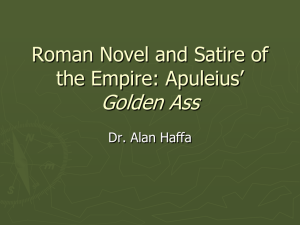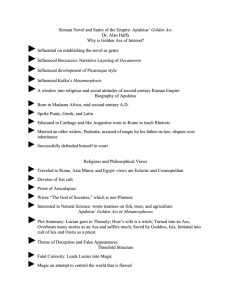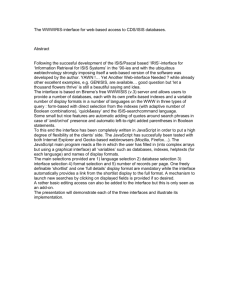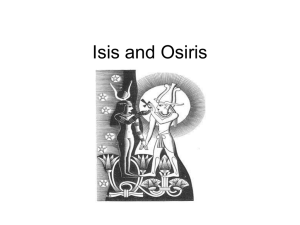Apuleius Part 2 - Nipissing University Word
advertisement
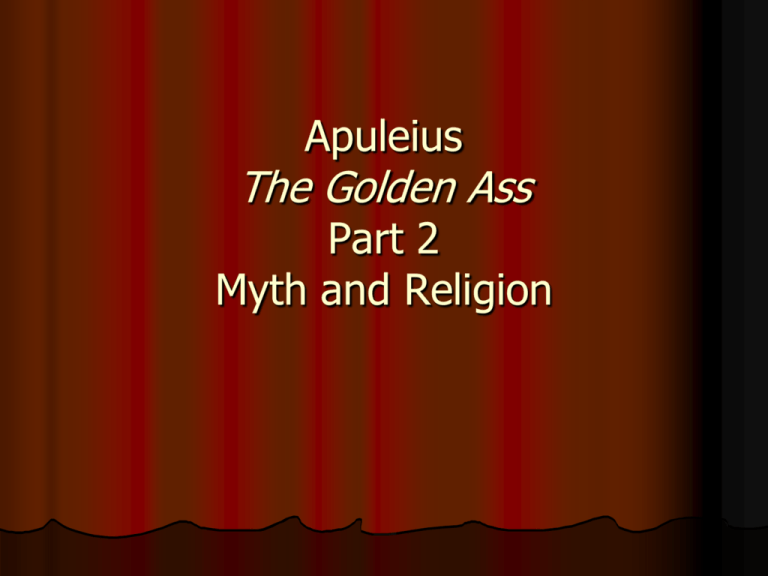
Apuleius The Golden Ass Part 2 Myth and Religion Mythic Allusions Audience is familiar with Greaco-Roman myths Socrates called “my Ganymede” by Meroe (1.12) – Note: reversal of gender roles Venus’ allusion to the “Judgment of Paris” (4.30) Allusion to the myth of Demeter and Persephone (6.2) References to the Underworld (1.15, 6.16-20) Pandora’s Box (6.21) Psyche as Pandora 6.21 Meroe as Medea 1.10 Psyche as Herakles Psyche is given 4 labors by Venus 1. Sorting the mountain of seeds (6.10) 2. Gathering the golden fleece (6.11) 3. Bringing water from the source of the Styx, Cocytus etc. (6.13) 4. Journey to the underworld to borrow make-up from Proserpina (6.16-20) Readers were familiar with these myths Religion in the Roman Empire Romans frequently incorporated foreign deities and cults into religious life highly eclectic religious context: they picked and chose and adapted what suited them best 205 BCE imported Magna Mater Idaea, a.k.a. Cybele ( from Asia Minor) 186 BCE Bacchus (Greek Dionysos) 37 CE – 41 CE – Isis and Osiris/Serapis established at Rome (Egypt) Increase of number of “Mystery Cults” (i.e. Eleusinian Mysteries; Dionysus; Orphic Cult; Isis; Christianity) Cannot speak of “Greek” or “Roman” or “Egyptian” but only of “Religion in the Ancient Mediterranean World” Contemporary ‘Roman’ view on the nature of Religious life in Rome (Minucius Felix, Octavius 6.8) “So it is that throughout all empires, provinces, and cities, we see that each people has its national rites of worship and adores its own local sets of gods. The Eleusinians…worship Ceres; the Phrygians…, the Great Mother; The Epidaurians,…Asculapeius; the Chaldaeans,…Bel; the Syrians,…Astarte; the Taurians,…Diana; the Gauls,…Mercury; and the Romans, all divinities. Thus their power and authority has occupied the circuit of the whole world; thus it has advanced the bounds of empire beyond the path of the sun and the frontier of the Ocean itself. When they fight in the field, they show bravery inspired by religion. At home they fortify their city with sacred rites, with the Vestal Virgins, and many priestly dignities and titles. When they were besieged….and all the city except for the Capitol taken, they still worshipped the gods, although other peoples, when their gods were angry, would have neglected them. When, in turn, they capture a city, they venerate the conquered gods, although still full of fury from the struggle. Everywhere they seek the gods of strangers and make them their own. They even build altars to unknown deities and spirits of the dead! Thus, while they adopt the rituals of all nations, they have also deservedly won dominion of all nations.” Religious Eclecticism in The Golden Ass Egyptian elements Greek elements Roman elements Celtic elements See a blending of many different myths, forming a single narrative. Reflecting the Ancient Mediterranean world as a ‘global culture’ The Religions of Lucius (Apuleius, Golden Ass 3.15. Photis: “ I’m scared she said, ‘and frankly terrified to disclose what this house conceals and to lay bare my mistress’ secrets. But I know I can rely on your character and training: you are a man of noble birth and lofty intellect and have been initiated in several cults Celtic Deities in Thessaly (Apuleius, Golden Ass 3.27. P.G. Walsh, 1994) Celtic Deity Epona 3.27 Epona = “The Great Mare”, Celtic goddess of horses, donkeys, and mules. Associated with fertility False Piety 1.The Priests of Atargatis (a Syrian Mother), 2.The Baker’s Wife – a Christian The Priests of Atargatis (Apuleius, Golden Ass, 9.8) “Having stayed in this place for a few days, fattened by public charity and stuffed with the ample proceeds of their prophesying these most chaste priests devised a new way of making money. They composed one allpurpose oracle and used it to bamboozle the crowds of people who came to consult them abut all sort of things. This was how it went: the yoked oxen drive the furrow now, so that one day luxuriant crops shall grow” The Christian Wife of the Miller (Apuleius, Golden Ass, 9.14) “Not a single vice was wanting in this abominable woman’s make-up; her heart was like a slimy cesspit in which every kind of moral turpitude had collected. She was hard-hearted, perverse, man-mad, drunken, and stubborn to the last degree. Tight-fisted in the squalid pursuit of gain, lavish in spending on debauchery, she had no use for loyalty and was a sworn enemy to chastity. Worse still, she had rejected and spurned the heavenly gods, and in place of true religion she had falsely and blasphemously set up a deity of her own whom she proclaimed as the One and Only God; and having bamboozled the world in general and her husband in particular by meaningless rituals of her own invention, she was able to give herself over to a daylong course of drinking and prostitution.” The Cruelty of Fate Fate is prominent and constant theme throughout novel: At first the experiences of Lucius and everyone else appears to be determined by fate Examples: 1. Good things happen to bad people, 2. Bad things happen to good people, 3. Sometimes people get what they deserve But human error consists in not recognizing the divine purpose of fate – and once Lucius is enlightened it is clear that there is a divine purpose behind fate: fate is not blind Fortune cannot be changed (Apuleius, Golden Ass, 9.2) “But it’s a dead certainty that nothing can go right for any human being if Fortune sets her face against him, and no decision, however prudent, no counter-measure, however cunning, can upset change what divine Providence has decreed and ordained.” Good Things Happen to Bad People The Roman Official and his Freedman (Apuleius, Golden Ass, 10.23) “My keeper more than happy to allow her to enjoy me as often as she wanted, partly because he was making a very good thing out of it, and partly because here was a way of providing his master with a fresh spectacle. He therefore lost no time in letting him into the secret of our erotic performances. The master rewarded his freedman liberally and decided to make a public exhibition of me.” Bad Things Happen to Good People The Market Gardner/The Baker’s Daughter/The Three Good Sons (Apuleius, Golden Ass, 9.42; 9.31; 9.35) The gardener 9.42 The miller’s daughter 9.31 The three good sons 9.35-38 The Moral of the Story? Morality! Isis: The True Faith and Salvation Books 1-10: displays, in increasingly violent terms, the utter depravity of the human animal Humanity is mired in a quagmire of greed, lust, faithlessness, and violence Book 11: Resolves the moral dilemma – Isis is the answer to human misery and morality caused by blind Fate Lucius realizes this through a series of figurative and literal epiphanies/realizations at 10.33; 11.1; 11.15 (these passages are important!) The Cult of Isis Egyptian deity who encompasses all other Egyptian goddesses Is worshipped together with her husband/brother Osiris Identified with Demeter by Greeks since at least 430 BCE Cult of Isis popular in Rome after 41 CE - 6th century CE Cult Figurine of Isis/Fortuna 1st Century CE http://www.vroma.org/images/mcmanus_images/isis_fortuna.jpg Isis with Horus http://www.ancientegypt.co.uk/gods/explore/images/stisis.jpg Isis Ritual – Temple of Isis Pompeii http://www.vroma.org/images/mcmanus_images/isispriest_candelabra.jpg Story of Isis and Osiris Born to Cronus and Rhea Consummate their relationship while still in the womb Osiris becomes first king of Egypt Associated with the following teachings: 1.Against cannibalism, 2.Laws, 3.Agriculture, 4.Religious ritual, 5.Marriage, 6.Technical skills Osiris killed by Typhoeus, who abducts his body Isis wanders the earth to find him Comes to Byblus – befriends the king’s daughters – brought home to nurse their infant brother – places him in fire at night to make him immortal – discovered by the queen – demands the body of Osiris Returns to Egypt with the coffin – Typhoeus dismembers the corpse and scatters the bits – Isis sets out to retrieve them – recovers all but the penis – made a wooden penis as a substitute Osiris returns from the dead to prepare Horus for battle with Typhoeus – Horus delivers Typhoeus to Isis in chains – Isis releases him Herodotus On Isis – ca. 430 BCE “The Egyptians meet in solemn assembly not once a year only, but on a number of occasions, the most important and best being the festival of Artemis at Bubastis: second in importance is the assembly at Busiris – a city in the middle if the Delta, containing a vast temple dedicated to Isis, the Egyptian equivalent of Demeter, in whose honor the meeting is held.” (2.59. A. De Selincourt, 1954) “The Egyptians say that Apollo and Artemis are the children of Isis and Dionysus, and Leto saved them and brought them up.: (2.156. A. De Selincourt, 1954) “All Egyptians use bulls and bull-calves for sacrifice, if they have passed the test for cleanliness; but they are forbidden to sacrifice heifers, on the ground that they are sacred to Isis. The statues of Isis show a female figure with cow’s horns, like the Greek representations of Io, and of all animals heifers are universally held by the Egyptians in the greatest reverence. This is the reason why no Egyptian, man or woman, will kiss a Greek, or use a Greek knife, spit, or cauldron, or even eat the flesh of a bull known to be clean, if it has been cut with a Greek knife.” (2.41. A. De Selincourt, 1954) Isis and Io – Alternate Versions “She [Io] entered Scythia and the Cimmerian Land, wandering over a large area and swimming through much of the sea both in Europe and in Asia, until she finally came to Egypt, where she regained her original form and gave birth beside the Nile to Epaphus. Hera asked the Curetes to spirit him off, and they did. When Zeus learned of it, he killed the Curetes and Io began searching for Epaphus. She wandered through all of Syria (for it was revealed to her that the wife of king Byblus was nursing her son) and after she found him she returned to Egypt and married Telegonus, who was at that time king of Egypt. She erected a statue of Demeter whom the Egyptians call Isis; they also call Io Isis.” (Apollodorus, Bibl. 2.1.3-4. M. Simpson, 1976) Isis and Iphis (Ovid, Met. 9.666-700) Once, there lived at Phaestus, not far from the town of Gnossus, a man Ligdus, not well known; in fact obscure, of humble parentage, whose income was no greater than his birth; but he was held trustworthy and his life had been quite blameless. When the time drew near his wife should give birth to a child, he warned her and instructed her, with words we quote:--“There are two things which I would ask of Heaven: that you may be delivered with small pain, and that your child may surely be a boy. Girls are such trouble, fair strength is denied to them.--Therefore (may Heaven refuse the thought) if chance should cause your child to be a girl, (gods pardon me for having said the word!) we must agree to have her put to death.” And all the time he spoke such dreaded words, their faces were completely bathed in tears; not only hers but also his while he forced on her that unnatural command. Ah, Telethusa ceaselessly implored her husband to give way to fortune's cast; but Ligdus held his resolution fixed. And now the expected time of birth was near, when in the middle of the night she seemed to see the goddess Isis, standing by her bed, in company of serious spirit forms; Isis had crescent horns upon her forehead, and a bright garland made of golden grain encircled her fair brow. It was a crown of regal beauty: and beside her stood the dog Anubis, and Bubastis, there the sacred, dappled Apis, and the God of silence with pressed finger on his lips; the sacred rattles were there, and Osiris, known the constant object of his worshippers' desire, and there the Egyptian serpent whose quick sting gives long-enduring sleep. She seemed to see them all, and even to hear the goddess say to her, “O Telethusa, one of my remembered worshippers, forget your grief; your husband's orders need not be obeyed; and when Lucina has delivered you, save and bring up your child, if either boy or girl. I am the goddess who brings help to all who call upon me; and you shall never complain of me--that you adored a thankless deity.” So she advised by vision the sad mother, and left her. ( Isis the embodiment of many deities Embodies the features/concerns of many other deities Ceres - - agriculture Juno - marriage Minerva - wisdom and crafts Venus - physical love Diana - childbirth Magna Mater - the Earth Fortuna - destiny, fortune See Lucius prayer to Isis Book 11. Charactericstics of the cult of Isis shared with Christianity Both share redemption and rebirth into a state of grace The promise of life after death if the tenets of the faith are kept An insistence of strict morality People are divided into believers and unbelievers – not on the basis of class distinctions Iconic imagery influenced Christian imagery (i.e. Mary and Jesus mirrored Isis and Horus; Mary’s blue dress, crescent moon, and title Stella Maris – Star of the Sea – borrowed from the Roman cult of Isis) Rebirth and Redemption (Apuleius, Golden Ass. See passages: 11.21 11.23; 11.25 Life After Death (Apuleius, Golden Ass, 11.6; 11.21) “But this you must remember well and keep forever stored up in your inmost heart: the remaining course of your life right up until your last breath is now solemnly promised to me ……And you will live happily, you will live gloriously under my protection; and when you have completed your lifespan and descend to the shades, there also in that subterranean hemisphere I, whom you now behold, shall be there, shining amidst the darkness of Acheron and reigning in the secret depths of Styx, and you shall dwell in the Elysian Fields and constantly worship me and be favoured by me. “For the keys of hell and the guarantee of salvation were in the hands of the goddess, and the initiation ceremony itself took the form of a kind of voluntary death and salvation through divine grace.” Strict Morality for the Cult Initiates (Apuleius, Golden Ass, 11.19) “….I had made thorough inquiries and knew that compliance with the requirements of her worship was not easy, that the practice of chastity and abstinence was very hard, and that a life that was subject to so many chischances had to be surrounded with a rampart of careful precaution.” Path to salvation is faith not birth and status (Apuleius, Golden Ass, 11.15) “ Many and various are the sufferings you have endured, and fierce the tempests and storm-winds of Fortune by which you have been tossed; but at last, Lucius, you have come to the harbour of Tranquility and the altar of Pity. Neither your birth, nor yet your rank, nor even your pre-eminent learning were of the slightest help to you, but in the unsteadiness of your green youth you lowered yourself to servile pleasures and reaped a bitter reward for your illstarred curiosity. But in spite of all, Fortune in her blindness, all the while that she was tormenting and cruelly imperilling you, has by the very exercise of her unforseeing malignity brought you to this state of holy felicity. Now let her go, let her vent her mad rage elsewhere and find some other subject for her cruelty; against those whose lives our sovereign goddess has claimed for her service mischance cannot prevail. Iconography of Ptolemaic Isis and Horus/Medieval Mary and Jesus isis.quickseek.com/ Isis With Horus/Mary and Jesus (Karanis - 20 BCE/Fayum - 5th Century CE) isis.quickseek.com/

